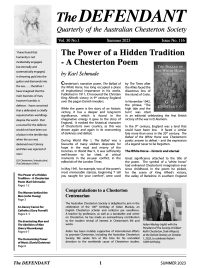Reviewing a recent book by an Australian scholar on Charles Dickens, the Swiss-American scholar, Michael Aeschliman, awarded high praise to Chesterton as “the greatest Dickens commentator”.
In his review published as “Dickens, Providence, and Us” (National Review, June 23, 2022), Aeschliman compares Chesterton’s judgment to that of the literary scholar, Jennifer Gribble, whose book, Dickens and the Bible (2020), focuses on Dickens’ understanding of Providence and the “meaning of life”.
Aeschliman describes the modern intellectual atmosphere in which this book will be read – conditioned by the perspectives of a postmodernist culture which exalts individual fulfilment and complacency. He points out that, like Chesterton, “Gribble sees Dickens not as any kind of smug, confident, philistine, masculinist Victorian, nor as a merely superficial, sentimental, dated entertainer, but precisely as the most thorough and wise critic of these self-interested and self-flattering perspectives — and thus, here and now, as an imaginative resource for self-knowledge and the future.”
Aeschliman acknowledges that Gribble’s book does not make easy reading. But he admires its readiness to take in the larger picture, and reflect on its implications and directions.
Noting Chesterton’s influence, Aeschliman comments:
“High-modernist writers and literary critics in the wake of Dickens often resented and ridiculed his influence, sometimes enviously. Against this resentment, Chesterton’s 1906 and 1911 books (the latter consisting of his introductions to the Everyman editions of Dickens’s novels) were a lonely, salutary challenge, defending the popularity that Dickens had and has never lost with ‘common readers’ throughout the English-speaking world.”
Aeschliman notes Gribble’s emphasis on Dickens’ deep knowledge of the Bible. “The New Testament,” she states, “was the heart of his moral imagination.” But, as Aeschliman comments, “she is aware of ‘post-modernism’s repression of the Bible’ . . . and of the secularizing machinery of public culture and institutions,” so that it is blind, not only to the Bible itself but to its fruits in Dante and Milton, and its expressions in primers and hymns, which have been the main means by which literacy became universal in the West.
As Aeschliman concludes:
“In what the French polymath Jacques Ellul calls “the humiliation of the Word,” our ideal seems to be literacy without ethics, functional rationality without morality, knowledge without conscience. The Bible, Shakespeare, and Dickens are our great antidotes and ripostes to this cultural amnesia.”
